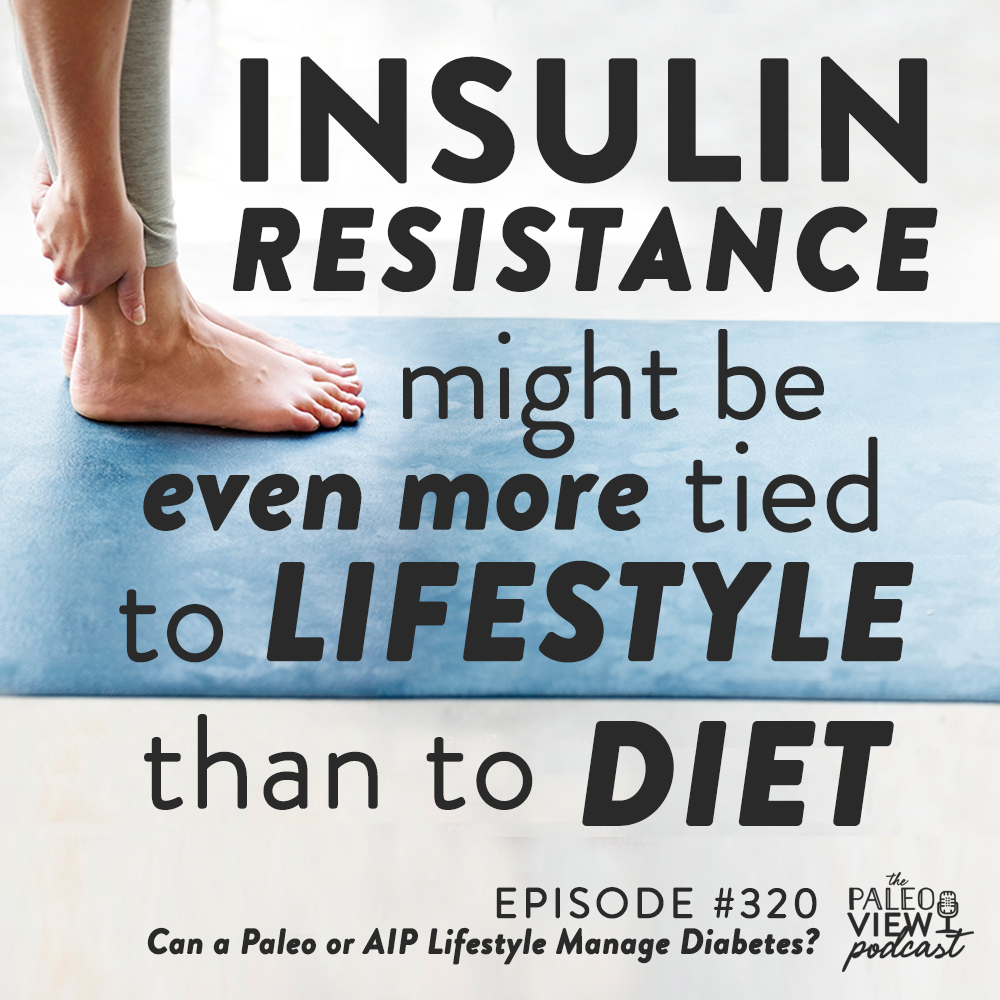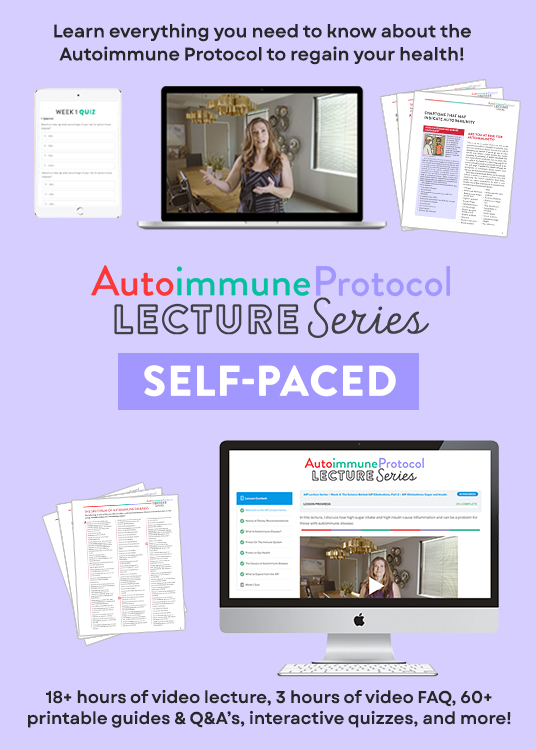In this episode, Stacy and Sarah go beyond diet as a way to prevent or manage diabetes, exploring why Paleo and AIP lifestyle factors like activity, stress management, and sleep are critical components. Sarah also shares a list of her top nutrients picks for improving insulin sensitivity.
Click here to listen in iTunes
or download and listen by clicking the PodBean Player below
![]()
If you enjoy the show, please review it in iTunes!
The Paleo View (TPV), Episode 320: Can a Paleo or AIP Lifestyle Manage Diabetes?
-
- (0:00) Intro
- (0:40) News and Views
- Welcome back! According to Sarah, the best way to do a podcast is in PJs!
- Over 6 years of TPV podcasts!
- Shout out to the listener Stacy met at the Queen City Mischief and Magic festival in VA! If you’re a Harry Potter fan, mark your calendar for next year’s festival!
- Sarah realizes she doesn’t need to be coy about transitioning into the podcast topic because listeners always read the episode title before listening to the podcast.
- (10:58) Question from Kayla: “Hi Stacy and Sarah! I loved your recap podcast! I’m writing because I haven’t seen a podcast yet about diabetes and AIP. I did listen to the insulin one, but I’m specifically wondering how AIP could be helpful to a diabetic. I had gestational diabetes with all four of my pregnancies, progressively worsening with each one until my last which was very hard to control. Unsurprisingly, I am now struggling with high blood sugar even though my baby was born 9 months ago. I’ve seen that diabetes is an autoimmune condition, but I really don’t understand the mechanics so it’s hard for me to be motivated to stick to the AIP diet. Would you be able to discuss that more on your podcast? Can Sarah please geek out on my behalf? Thanks so much for your amazing work!”
- Sarah geeks out with general diabetes statistics
- Estimated 9.3% of the American population has diabetes.
- Type II Diabetes accounts for 95% of diabetes in America and Type I accounts for the remaining 5%.
- Sarah geeks out with general diabetes statistics
- (13:17) The difference between Type I and Type II Diabetes
-
- Type I Diabetes is an autoimmune condition where the body’s immune system is attacking the beta cells, which are the cells in the pancreas that make insulin.
-
- Type II Diabetes is a diet and lifestyle disease where the pancreas can still make insulin, but the body becomes less and less responsive to it until it’s unable to manage blood sugar levels. Also known as insulin resistance.
-
- Because Type I diabetes is an autoimmune condition, Sarah recommends following the Autoimmune Protocol (AIP) in addition to the other suggestions in this podcast.
- Traditional recommendations from American Diabetes Association for regulating insulin is “almost good,” according to Sarah. Sarah likes their guidelines for measured carbohydrates, eating carbohydrates with protein, fat, and fiber, and focusing on whole food carbohydrates, but disagrees with their recommendations to eat whole grains and vegetable oils.
- One study shows that the Paleo Diet does a better job at regulating blood sugar than the Mediterranean Diet.
- Another study shows the Paleo Diet was more effective at improving glucose control and lipid profiles than the American Diabetes Association diet.
- Currently, no studies looking at the long term effects of the Paleo Diet on diabetes.
- (30:03) Lifestyle factors like activity, stress management, and sleep may have even more of an impact on insulin sensitivity than diet.
- Activity improves the body’s insulin sensitivity receptors, both the number of receptors and their sensitivity.
- One study in healthy adults showed a 67% increase in amount of insulin needed to shuttle glucose out of the blood after 5 days of bedrest. People who are overweight and obese have an even greater increase in the amount of insulin needed.
- Sedentary periods also increase blood pressure, cholesterol, and other symptoms of metabolic syndrome.
- Taking a 2 minute activity break every 20 minutes can negate these effects. This can be as simple as getting up and moving around!
- More muscle mass equals more insulin sensitivity, which means there’s benefit to doing muscle building exercises.
- Neither weight training nor cardio will negate the negative effects of sitting at a desk all day.
- (39:43) Chronic stress and acute stress are big factors in determining insulin sensitivity.
- Our fight or flight response regulates which bodily systems are prioritized. If we’re constantly stressed our body isn’t focusing on the immune system, digestion, reproductive functions, protein synthesis, bone formation, and regulating blood sugar.
- Chronic stress directly causes insulin resistance via cortisol.
- Researchers say chronic stress may be the number one contributor to metabolic system.
- Even acute stress causes insulin resistance and hyperglycemia because it’s creating readily available energy for running away or other survival mechanisms.
- Sarah recommends working on resilience activities and managing stress. Practice saying “no,” delegating, spending time in nature, cuddling, laughter, yoga, meditation, and down time.
- Stacy asks how these studies are measuring stress. Sarah says researchers are measuring cortisol levels and analyzing participant questionnaires.
- (49:02) Not getting enough sleep is a huge risk factor for diabetes.
- If you get less than 6 hours per night on a regular basis, you increase your risk of Type II diabetes by 50%! And you increase your risk of either diabetes and/or pre-diabetes by 2.4 times.
- Studies have shown that even a single night of lost sleep will make you insulin resistant.
- One study showed for every 30 minutes of weekday sleep debt the risk of obesity is 17% higher and the risk of insulin resistance is 39% higher – even if you’re getting 15 hours of sleep on the weekends.
- (52:56) Stacy and Sarah discuss nutrients that are particularly important for insulin sensitivity.
- First off, always check with a health care provider before taking even a supplement. Some supplements do not mix with certain drugs.
- Vitamin D. Get your levels tested and supplement within the functional range of Vitamin D. Then retest your levels every 3 months. Vitamin D levels can change seasonally.
- Zinc. Important for glycemic control and the immune system. Ideally get it from foods like shellfish and nuts and seeds.
- Vitamin K2. Important for blood sugar management and can even reduce your risk of getting diabetes. Best sources are grass-fed meat, organ meat, grass-fed dairy.
- Chromium. More relevant for those who haven’t been getting a lot of nutrients and may be just starting a Paleo Diet.
- Magnesium. Some studies show supplementation can improve glycemic control, but it’s hit or miss. Data is stronger showing adequate intake of magnesium can prevent diabetes.
- Alpha Lipoic Acid. Has been shown in clinical trials to improve insulin sensitivity in those with Type II Diabetes.
- Berberine. Food sources can be hard to find. One source is Oregon Grapes, but they’re only found in the Pacific Northwest. A couple studies have shown Berberine can be as effective as certain diabetes drugs.
- Curcumin (from turmeric). Anti-inflammatory. Some evidence showing it can prevent diabetes in people who are at a higher risk.
- Cinnamon. Also anti-inflammatory. Can reduce cholesterol by 18% and reduce blood sugar levels by 24%. Both Cassia and Ceylon cinnamon has this effect. Be warned, do not just eat a tablespoon of cinnamon – it will hurt!
- Conjugated Linoleic Acid (food, not supplement). Can be found in grass-fed meat and dairy from ruminant animals. Can significantly lower risk of diabetes.
- There is also preliminary evidence (some mixed, not conclusive) for blood sugar lowering properties of:
- CoQ10
- Aloe
- Ashwagandha
- Ginkgo
- Green coffee bean extract
- Glucosamine
- Black cohosh
- Rhodiola
- Reishi mushroom
- Tart cherry juice
- White mulberry
- Fenugreek
- Milk thistle
- Ginseng
- Inositol
- Stacy suggests one way to get some of these amazing nutrients: FourSigmatic Mushroom Hot Cocoa with Reishi and Cinnamon. For more on medicinal mushrooms check out Episode 307.
- Get your questions in! We want to hear from you! And there’s no end to questions we can answer and topics we can address!
- Engage on social media! That’s how we get feedback!
- Thank you for listening
“diet is only one factor here. insulin resistance might be even more tied to lifestyle than to diet.”
Relevant posts
American Diabetes Association Guidelines

Save 70% Off the AIP Lecture Series!
Learn everything you need to know about the Autoimmune Protocol to regain your health!
I am loving this AIP course and all the information I am receiving. The amount of work you have put into this is amazing and greatly, GREATLY, appreciated. Thank you so much. Taking this course gives me the knowledge I need to understand why my body is doing what it is doing and reinforces my determination to continue along this dietary path to heal it. Invaluable!
Carmen Maier










